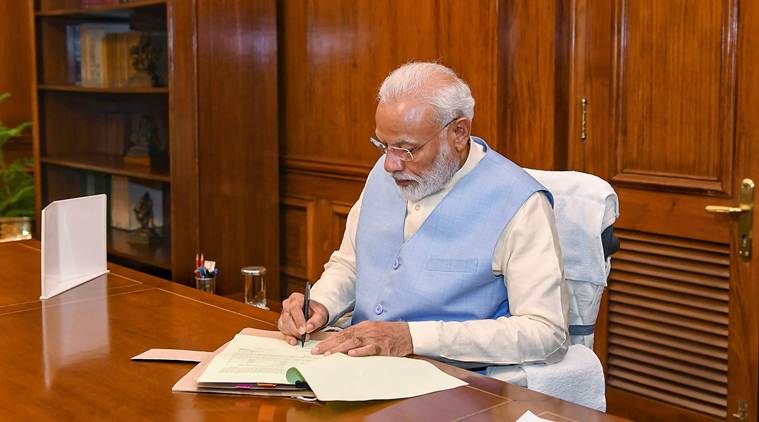
The mandate that Mr Narendra Modi received is undeniably huge. Of course, there have been occasions in the past when a political party got more seats than 303 in a Lok Sabha election. Some examples are Indira Gandhi in 1980 (353) and Rajiv Gandhi in 1984 (404). But the circumstances were different: Indira Gandhi had waged a brave struggle against an unpopular coalition government, suffered many forms of harassment including imprisonment, and almost single-handedly won back the support of the people who had defeated her party and her (in Rae Bareli). In the case of Rajiv Gandhi, he rode a wave of sympathy that had been triggered by the assassination of Prime Minister Indira Gandhi.
Broad voter support
Not only the number of seats won (303), but the sweep and scale of the BJP’s victory are astounding. The BJP could not penetrate only three states — Kerala, Tamil Nadu and Andhra Pradesh. The margins were unbelievably large, too large by conventional standards in a straight contest between two parties (as it was in Gujarat, Rajasthan, Haryana, Madhya Pradesh, Chhattisgarh, Himachal Pradesh, Uttarakhand and Assam).
While there are no authentic numbers, polls and surveys have affirmed that, as expected, the upper castes voted in large numbers for the BJP across the Hindi-speaking and Hindi-knowing states. So did the Other Backward Classes and, surprisingly, a significant proportion of Dalits, Muslims and Christians. Their motivations may have been different, but the fact is they gave their votes to the BJP.
Got votes, not trust
Mr Narendra Modi, I think, is happy but not satisfied. There is something that he has discerned which, perhaps, others in his party have failed to grasp: that it is not enough to get the votes of the Dalits, the Muslims, the Christians and the very poor, it is necessary to win their trust. He knows that he did not enjoy their trust at the end of his first term and has, therefore, added Sabka Vishwas to his original slogan Sabka Saath, Sabka Vikas.
It is a smart move, but it is fraught with difficulties. The obvious hurdles have names — Mr Giriraj Singh,
Ms Sadhvi Niranjan Jyoti and Mr Sanjeev Balyan. There are others, elected but discarded or elected and waiting —
Mr Mahesh Sharma, Mr Anantkumar Hegde, Mr Sakshi Maharaj, Ms Sadhvi Pragya Singh Thakur and others unknown.
Mr Giriraj Singh, a Cabinet minister, has already made an unwarranted remark on two allied party leaders attending an iftar party. He earned a rebuke from the president of the BJP, but he has not expressed regret. After his election, Mr Sakshi Maharaj visited a prisoner (an MLA accused of rape in an incident in Unnao that shook the nation in 2017) to thank him for his victory. He has not been rebuked so far.
It is not easy to get rid of prejudices that have been ingrained since childhood or youth. It doesn’t help if senior leaders of the RSS and BJP give expression to these prejudices from time to time (‘electricity for Eid, no electricity for Diwali’, ‘constituency where minority is majority’). It doesn’t help if the lynching of Dalits and Muslims does not stop and at least one case is reported every week. It doesn’t help change perceptions if the BJP has one elected MP from the Muslim community among its 303 members.
Fear, welfare
There is another formidable problem. The BJP can win the trust of these sections only if two conditions are fulfilled. The first condition is that no one should live in fear. The second condition is that their economic status should steadily improve. Neither condition is fulfilled today; it would be interesting to see how the government goes forward to fulfill these two conditions.
Banishing fear among certain sections of the people requires bold steps. Every time there is an act of impunity, the act and the actor must be punished. Will the BJP punish those who act with impunity and spread fear? It is a big ask, on present evidence it does not seem likely, but I hope that the BJP’s leadership will assert its authority over those who indulge in culpable behaviour.
The second condition is, objectively, not entirely under the control of the government. The economic status of the disaffected sections will begin to improve only if they get more jobs; more job security; higher incomes; and better access to public goods and services. Jobs and incomes are a function of high and equitable economic growth and, given how the year 2018-19 ended on a dismal note, high or equitable growth is not around the corner.
The sections of the Dalits, Muslims, Christians and below-the-poverty-line, I suspect, voted for the BJP’s candidate because no other candidate seemed capable of winning the contest and certainly no other candidate appeared to be on the ‘winning’ side. It was a vote of prudence; it was not a vote of confidence. The BJP has to do much more to win their confidence.
It is an unusual situation. The BJP has formed the government with the votes of passionate supporters (in whose eyes Mr Modi can do no wrong) and the votes of disaffected sections (in whose eyes Mr Modi has not done anything right so far).
It will be interesting to see how the resourceful Mr Modi navigates these uncharted waters.